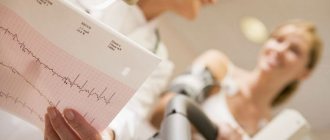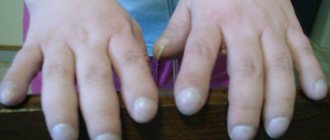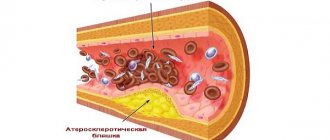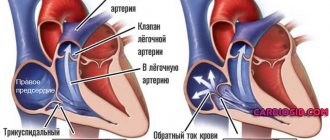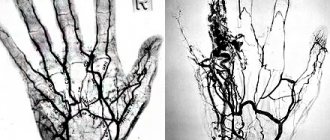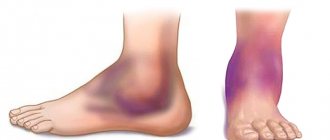Cerebrovascular disease is characterized by damage to the blood vessels of the brain, as a result of which the supply of oxygen to brain cells is disrupted, oxygen starvation begins, and brain functions are disrupted.
The disease is treated in neurological clinics and centers, including the neurology clinic of the Yusupov Hospital. How cerebrovascular disease begins and what it is, a neurologist will tell you in more detail at a consultation.
Treatment
Treatment of the disease is carried out using complex therapy, which includes the following groups of drugs:
- antisclerotic drugs;
- antihypertensive drugs;
- hypoglycemic drugs;
- metabolism;
- antihypoxants;
- antioxidants;
- antispasmodics;
- anticoagulants;
- nootropics;
- vasodilators.
In advanced cases, the disease is severe, and drug treatment does not show high effectiveness. In this case, the neurologist decides to perform surgical treatment. During the operation, the surgeon removes blood clots and atherosclerotic plaques in the vessels that narrow the lumen of the vessel. Stenting, endarterectomy, balloon angioplasty, and extra-intracranial anastomosis can be performed. Such surgical interventions are performed in case of vascular obstruction, severe narrowing of the vessel, to remove atherosclerotic plaques and restore vascular patency.
How to lower your heart rate on your own?
So, if you are sure that you are completely healthy, do not need treatment, and want to reduce your heart rate, you can use these tips.
Avoid overheating
When a person is hot, his body must get rid of excess heat. One of the most effective mechanisms is sweating. The skin's sweat glands begin to work actively, and it requires more blood. At the same time, the body loses a lot of fluid. This creates additional stress on the heart, and it is forced to contract more often. This is a normal occurrence during visits to baths and saunas. The problem occurs when overheating becomes constant - for example, in the summer, or if you work in a room with high temperatures. In such cases, it is worth spending more time in the shade or under air conditioning. If that doesn't work, then at least drink more fluids.
Exercise regularly
Lowering your heart rate is just one benefit of regular exercise. They also help generally improve the condition of the cardiovascular system, normalize weight, ensure good health, and even reduce the risk of developing cancer.
And don’t be confused by the fact that the advice from this point seems illogical at first glance. Yes, when you exercise, your heart rate increases. This is a temporary effect. Over time, your heart becomes more trained and can pump blood more and more efficiently. This means he doesn't have to contract as often as before.
Eat more fish
Like physical activity, healthy eating is beneficial in many ways. Fish should be present in every person's diet at least once a week. One of the beneficial effects is a reduction in heart rate and the risk of death from coronary disease, myocardial infarction. This conclusion was reached by scientists from the American Heart Association based on the results of a study published in 2003.
If you do not like fish dishes, you can purchase some kind of dietary supplement with fish oil.
Protect yourself from stress
There are two parts of the autonomic nervous system in the human body. The parasympathetic department predominates in a state of rest - it reduces the frequency and strength of heart contractions. The sympathetic one is activated in a state of stress - it causes an effect that can be figuratively described as “fight or flight.”
Unlike primitive ancestors, the modern average person does not need to run away from anyone or fight with anyone. But stress levels are off the charts, especially in big cities. If you don’t see ways to protect yourself from stressors, you can start small:
- set aside some time every day to turn off your phone, computer, TV and other gadgets;
- practice meditation - just 15 minutes a day is enough to start.
Do breathing practices
The work of the heart and lungs is closely related. Deep, mindful breathing helps quickly reduce stress levels and “calm” the cardiovascular system. Inhale for five seconds and then exhale slowly for 15 seconds. It can be helpful to do a few of these inhalations and exhalations from time to time, especially when you are very nervous. You can also consider breathing practices that are used in yoga - pranayama.
Stop smoking
Smoking is most often talked about as the cause of lung cancer and other cancers. Many manufacturers of smokeless nicotine delivery devices play on this: advertising claims that they are supposedly almost safe. In fact, the main enemy of health is nicotine, and the main blow falls on the cardiovascular system.
After smoking a cigarette (or vaping, hookah, whatever), the lumen of the arteries and veins narrows. As a result, it becomes more difficult for the heart to push blood through, and it begins to contract more often. This happens even at rest.
The good news is that this effect is reversible, and quite quickly. While it takes several years to reduce the risk of developing lung cancer, the pulse returns to normal within 24 hours after the last cigarette smoked. In addition, this way you can lower your blood pressure. Further more: giving up a bad habit will lead to a significant improvement in your health and overall well-being.
Drink enough fluids
When the body loses a lot of fluid, the blood thickens and it becomes more difficult for the heart to pump it. The lack of effort is compensated by an increase in heart rate. Therefore, if you want to slow down your heart rate, you need to hydrate your body regularly. However, it is important not to overdo it, especially for people with high blood pressure, varicose veins and swelling in the legs and other cardiovascular diseases. Try to drink more fluids in the morning and reduce your intake in the evening.
It is important to remember two more recommendations:
- It is better to drink plain water, and certainly not drinks with sugar (sweet tea and sparkling water). Added sugars lead to extra pounds and additional stress on the heart.
- Avoid drinks with alcohol - it thickens the blood.
Limit your caffeine intake
Caffeine itself increases your heart rate. And even if this is a temporary effect, it will become permanent if you are a “coffee addict.” In addition, caffeine acts as a diuretic and promotes fluid loss - and we have already discussed the negative effects of dehydration above.
Maintain a normal weight
Extra pounds are additional fatty tissue through which blood also needs to be pumped, which increases the load on the heart. This effect is especially pronounced if the body has a lot of fat but little muscle mass. In addition, obese people often develop atherosclerosis, which is a difficulty in blood flow through narrowed vessels and increased blood pressure with all the ensuing consequences.
In fact, bringing your body weight back to normal is not that difficult. For most people, following two recommendations is enough:
- Eat right. And here we are not talking about strict, exhausting diets - they will only do harm. You just need to stick to a healthy diet that won't load your body with a lot of fat, fast carbohydrates and calories.
- Play sports. This will help you lose extra calories. After all, the human body was not designed by nature to constantly spend time in an office chair or on the couch in front of the TV. We are not adapted to this way of life.
Get a good night's sleep
A full night's sleep is not just rest. This is one of the important components of the biological clock built into the human body - circadian rhythms. When they are violated, all organs suffer. This occurs with chronic lack of sleep, irregular routine, and night shift work. And one of the negative effects is an increased load on the heart, a malfunction of the cardiovascular system. By the way, taking a nap during the day is also useful, but not for too long. Twenty minutes is enough.
Symptoms and treatment, causes of development
Cerebrovascular disease (CVD) in the early stages of development is characterized by sleep disturbance in the patient (insomnia, sudden awakening in the middle of the night and inability to fall asleep after waking up), fatigue, low performance, memory loss, fussiness, absent-mindedness, and impaired thinking. The patient's condition worsens as the disease progresses. Severe headaches, dizziness, tinnitus, numbness and weakness in the limbs, impaired vision and hearing appear, the patient suffers from depression, and dementia may develop. All these symptoms indicate a cerebrovascular accident.
The causes of the disease are various factors:
- stroke – often causes the development of cerebrovascular disease;
- cerebral atherosclerosis is the most common cause of CVD development;
- chronic stress;
- smoking;
- alcoholism;
- excess weight;
- diabetes;
- pathology of the structure of blood vessels;
- diseases of the circulatory system;
- hypertension;
- tumors;
- infectious diseases;
- antiphospholipid syndrome;
- injury.
Treatment of CVD depends on the cause of the disorder and the severity of the disease. In some cases, surgery becomes the main treatment method.
The cause of the development of cerebrovascular disease is inflammatory processes in the vessels of the brain, affecting arteries and veins. The most common cause of the disease is cerebral atherosclerosis. Treatment of the disease begins with the elimination of increased risk factors:
- diabetes;
- cerebral atherosclerosis;
- arterial hypertension;
- elevated blood cholesterol.
Drug therapy and diet help restore the elasticity of blood vessels, improve blood circulation in the brain, and reduce the risk of developing cerebrovascular disease.
What does heart rate depend on and how to measure it correctly
The heart of a healthy person works like a clock, but, unlike the movement of the second hand, the frequency of its contractions either slows down or speeds up. This is influenced by many factors:
- physical exercise;
- Body temperature;
- stress, intense joy, excitement;
- dehydration;
- drinking drinks that contain alcohol and caffeine;
- smoking;
- taking certain medications.
So how do you know what your “real” heart rate is?
To do this, you need to measure it at rest, and before doing so, do not take alcohol, caffeine, take any medications, or smoke. The best time is immediately after waking up, while you are still in bed. It is most convenient to feel the pulse on the radial artery. Place your thumb on the inside of your wrist and your index finger on the outside of your wrist, under your thumb. To accurately determine your pulse, you need to use a stopwatch. You may come across recommendations that require taking measurements for 15 or 30 seconds, and then multiplying by four or two, respectively. But it’s better to spend a minute - it will be more accurate.
It is also important to remember that each person’s heart rate is individual, and it is also influenced by body size and age. Also, heart rates tend to be low in well-trained athletes.
Intracranial hypertension
Cerebrovascular disease is considered a collective term that covers various diseases that lead to impaired cerebral circulation. Such diseases can occur in both acute and chronic forms and belong to the class of cerebrovascular disorders. Intracranial hypertension is characterized by abnormally high intracranial pressure. Chronic intracranial hypertension most often refers to the idiopathic form of the disease; the cause of the development of the disorder remains unclear. Intracranial hypertension is common, often in people with neurological diseases.
Intracranial hypertension leads to impaired cerebral circulation and provokes the formation of secondary cerebral ischemia. Cerebrovascular diseases become the cause that leads to the development of intracranial hypertension. Increased intracranial pressure can lead to coma, sensory disturbances, speech disorders and other severe disorders. Intracranial hypertension is a severe complication of brain diseases.
Prevention of pathology
Cerebrovascular insufficiency is a fairly serious disease that poses a threat to human life. Following simple rules from youth helps to avoid hospitalization and treatment. These include giving up all bad habits, adjusting your diet and lifestyle. It is advisable to include more green vegetables, fruits and cereals in the diet, reducing the consumption of fried, smoked, spicy, etc.
Among other things, it is recommended to balance work and rest. Avoid excessive stress and overwork, be sure to find time for proper sleep and rest.
If the diagnosis of cerebrovascular disease has already been made, it is necessary to follow the rules listed above, adjust your weight, and engage in regular light sports exercises: running, walking, swimming. To improve brain functions, you can memorize poems, solve crosswords, and solve logical problems. Be sure to adhere to the prescribed treatment regimen and undergo preventive examinations on time.
Encephalopathy
Discirculatory encephalopathy is characterized by diffuse or focal damage to the blood vessels of the brain. The disease leads to impairment of memory, thinking, attention; a serious complication of the disease is the development of dementia - dementia. The course of the disease is accompanied by various symptoms:
- impairment of motor activity;
- cerebellar dysfunction;
- affective disorders;
- sharp fluctuations in blood pressure;
- dizziness;
- disorders of chewing and swallowing food, other pseudobulbar disorders;
- at a late stage of the disease, patients experience fecal and urinary incontinence.
The cause of the disease is cerebral atherosclerosis, hypertension, various disorders leading to damage to the vascular system, blood diseases and other causes.
FAQ
Does CVD only occur in older people?
Naturally, CVB occurs more often in old age, but it also happens in young people. Especially in the presence of congenital vascular anomalies and predisposition. Therefore, it is incorrect to base the diagnosis of this disease only on age.
I had a stroke. Could it happen again?
Recurrent strokes are quite common. Especially if adequate preventive treatment is not carried out. With regular monitoring by a neurologist and following the doctor’s recommendations, the likelihood of recurrent strokes is significantly reduced.
What tests should I undergo if I have cerebral vascular disease?
The scope of necessary laboratory and instrumental tests should be determined by a neurologist at the appointment, because it is individual. Most often, laboratory tests examine indicators of blood clotting, kidney and liver function, pancreas and blood lipid metabolism; from instrumental studies: ultrasound examination of blood vessels, brain tomography and others.
Statistics
Strokes, which are the cause of the development of CVD, lead to the death of a huge number of people every year; 40% of stroke survivors die or become disabled. Timely contact with a neurologist when symptoms of trouble appear, a healthy lifestyle, and a balanced diet reduce the risk of developing cerebrovascular disease.
The neurological clinic of the Yusupov Hospital provides care to people with cerebrovascular diseases. In the hospital you can undergo treatment for cerebrovascular disease and rehabilitation after illness. Doctors pay great attention to the prevention of the development of vascular diseases of the brain; the hospital has developed programs to restore the functions of a patient’s brain after a severe stroke, and treats dementia and chronic cerebrovascular disease. During the consultation, the doctor will explain what cerebrovascular disease is in humans, how the hospital provides drug treatment for cerebrovascular disease of the brain, and surgical treatment for cerebrovascular disease. The patient's medical history will be saved on a modern medium; upon completion of treatment, the patient will receive a full description of his treatment in the clinic. You can make an appointment with a doctor by calling the Yusupov Hospital.
Diagnosis of CVD
Primary diagnosis is carried out by a neurologist and includes:
- thorough examination of complaints, medical history and life history
- assessment and analysis of symptoms, including those preceding the disease
- full neurological examination
According to indications, additional examination methods are prescribed:
- laboratory research
- ultrasound examinations, including duplex and triplex scanning of blood vessels with Dopplerography
- functional, incl. 24-hour blood pressure monitoring and ECG
- X-ray
- MRI and CT of the brain
According to indications, a consultation with other medical specialists is prescribed, including a cardiologist, endocrinologist, therapist, nephrologist, psychotherapist, etc.
